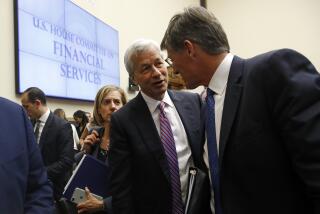Dimon defends JPMorgan’s lobbying against some financial rules
- Share via
WASHINGTON -- JPMorgan Chase & Co. Chief Executive Jamie Dimon on Tuesday defiantly defended his lobbying against some new financial regulations as he faced tough questioning by lawmakers about the bank’s huge trading loss.
Appearing before a congressional committee for the second time in less than a week, Dimon again said the bank was sorry for the more than $2-billion loss. But he downplayed the consequences for the company and the financial system, saying JPMorgan soon would report a solid profit for the second quarter of the year.
Dimon apologized that JPMorgan’s trading loss was distracting Washington officials from fully focusing on the European debt crisis.
“I’m sorry I’ve taken up so many people’s time with this loss because it is not significant in the global scheme of things,” Dimon told the House Financial Services Committee.
Dimon faced much tougher questioning than he did on Wednesday before the Senate Banking Committee, from both Democrats and Republicans. Rep. Barney Frank (D-Mass.) at one point told Dimon “please don’t filibuster” when he didn’t directly answer a question.
Frank asked Dimon if his compensation would be on the table for claw-backs by the company in light of the trading loss. Dimon said that was not up to him.
“My compensation is 100% up to my board,” Dimon said.
Dimon defended JPMorgan’s lobbying against parts of the Dodd-Frank financial reform law, including a provision that would mandate more disclosure of derivatives trading done by overseas units.
“Lobbying is a constitutional right and we have a right to have our voice heard,” Dimon said.
“I’m not questioning your right to lobby,” said Rep. Maxine Waters (D-Los Angeles). “I’m questioning what’s in the best interest of the American public.”
Rep. Sean Duffy (R-Wis.) pressed Dimon on how regulators could oversee a huge bank like JPMorgan if they were unable to spot the bank’s risky trading before the losses got so large.
“Are you too big to fail?” Duffy said, warning against future Wall Street bailouts.
“No, we’re not too big to fail,” Dimon said.
But Duffy pressed him on what would happen if the losses by JPMorgan, which has $2.3 trillion in assets, were higher. Asked if it was fair to say the bank could lose more than $500 billion or more at some point, Dimon said, “Not unless the Earth is hit by the moon.”
Dimon submitted nearly exactly the same four-page written testimony to the House committee as he did to the Senate Banking Committee last week, which he read as his opening statement. He reiterated that the bank was embarrassed by the loss and that it “let a lot of people down and we are sorry for it.”
But he also said the loss should be put into perspective, saying no customer or taxpayer money was lost.
“When we make mistakes, we take them seriously and often are our own toughest critic,” Dimon said. “In the normal course of business, we apply lessons learned to the entire firm. While we can never say we won’t make mistakes -- in fact, we know we will -- we do believe this to be an isolated event.”
Outside the Capitol Hill hearing room, about 30 members of National Nurses United, dressed in red and green Robin Hood outfits, pushed for a tax on Wall Street trades.
“Jamie Dimon, you’re no good. People need a Robin Hood,” they chanted in the hallway. They bill the tax of 50 cents per $100 traded as a Robin Hood Tax that would generate billions of dollars to help average Americans.
RELATED:
JPMorgan Chase’s huge loss exposes the risky side of banks
Regulator unaware of JPMorgan loss until weeks before disclosure
JPMorgan CEO gives ‘A-plus’ performance in testimony on Capitol Hill
More to Read
Inside the business of entertainment
The Wide Shot brings you news, analysis and insights on everything from streaming wars to production — and what it all means for the future.
You may occasionally receive promotional content from the Los Angeles Times.











